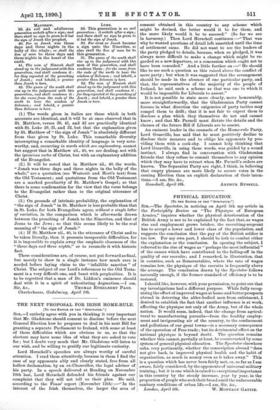PHYSICAL EDUCATION.
[To THE EDITOR or THZ " SPECTATOR:1 SIR,—The Spectator, in noticing on April 5th my article in the Fortnightly _Review on "The Physique of European Armies," inquires whether the physical deterioration of the British Army is not to be explained by the fact that, as wages rise and employment grows brisker, the recruiting-sergeant has to accept a lower and lower class of the population, and suggests the conclusion that the pay of the British soldier is too low. For my own part, I should be loth to combat either the explanation or the conclusion. In opening the subject, I referred to the rise of wages as "perhaps the most influential" of the causes which have contributed to the falling-off in the quality of our recruits; and I remarked, in illustration, that in counties, such as Somersetshire, where the rate of wages remains low, the physique of the recruits is frequently above the average. The conclusion drawn by the Spectator follows naturally enough, if the former standard of efficiency is to be restored.
I should like, however, with your permission, to point out that my investigations had a different purpose. While fully recog- nising the effect of improved wages at home and better prospects abroad in deterring the abler-bodied men from enlistment, I desired to establish the fact that another influence is at work, affecting the physique not only of the Army, but of the whole nation. It would seem, indeed, that the change from agricul- tural to manufacturing pursuits—from the healthy employ- ment and invigorating air of the country, to the confinement and pollutions of our great towns—is a necessary consequence of the operation of Free-trade; but its detrimental effect on the national physique is beyond doubt. The question remains whether this cannot, partially at least, be counteracted by some system of general physical education. The Spectator elsewhere asks, very pertinently, whether the conscription abroad "does not give back, in improved physical health and the habit of organisation, as much in money even as it takes away." This is a question which has never been fairly met, or, so far as lam aware, fairly considered, by the opponents of universal military training; but it is one which is raised to exceptional importance in this country by the steady increase, year by year, in the proportion of people who seek their bread amid the unfavourable sanitary conditions of urban life.--I am, Sir, &c.,


































 Previous page
Previous page